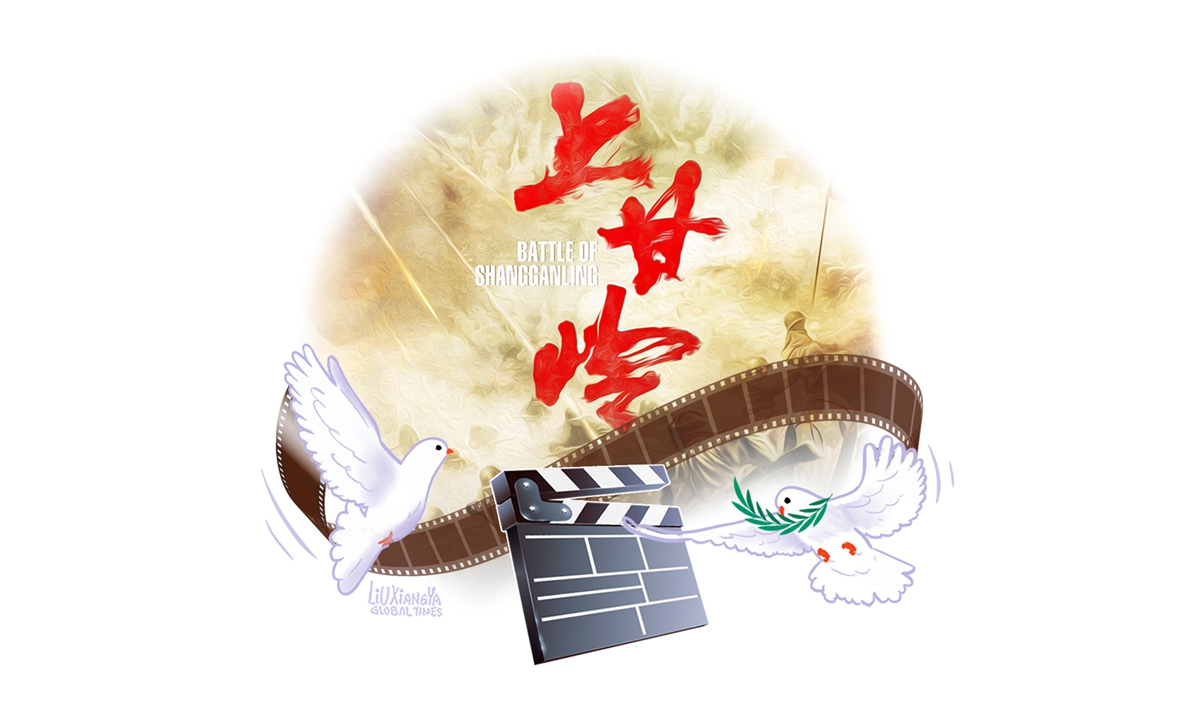
Illustration: Liu Xiangya/GT
When it comes to high-quality and popular war-themed productions, Chinese filmmakers and TV producers do not merely seek spectacle and dramatic impact, they also attempt to convey messages for peace that are rooted in patriotism and a profound sense of national identity. This emphasis on peace and a sense of belonging is regarded as the spiritual core of the genre.
The new Chinese TV series
Battle of Shangganling, which presents a panoramic artistic depiction of the entire battle of Shangganling during the War to Resist US Aggression and Aid Korea (1950-53) for the first time, has gained in popularity among Chinese audiences.
"Lots of people see war-themed TV series in China as visually stunning spectacles filled with constant fighting and gunfire, and I want to change that perception," the series director, Hong Kong filmmaker Lau Wai-Kong (Andrew Lau), told the Global Times.
"I particularly hope to use the brutal war scenes to immerse viewers and encourage them to remember the unyielding spirit of Chinese soldiers during the wartime era and to cherish the present."
The series air on streaming platform Youku and China Central Television. It not only artistically portrays the heroic figures of the Chinese People's Volunteers (CPV) army who participated in the battle of Shangganling, but also reflects the true historical context and scenes from that period.
"I aim to amplify these real experiences through my work so that audiences can appreciate the hardships of the past. It is precisely because of the sacrifices made by our predecessors that we enjoy our current lives. This is the core message I wish to convey through my work," he said.
One scene that left a deep impression on Lau depicts the soldiers facing the choice to either give up or persist on the battlefield. He recalls the impactful line: "It's either endure or die." This phrase deeply moved him, encapsulating the spirit of the soldiers at that moment, a spirit that runs throughout the entire work, motivating the volunteers to press on.
Lau, who has produced countless classic films such as
Infernal Affairs, Initial D, and
Confession of Pain, first thought of making a patriotic TV series many years ago. He shared that he had watched numerous Chinese war documentaries, often moved to tears by them, which deeply affected him and instilled in him the necessity to create something genuinely valuable.
Reflecting on his first work in the patriotic genre, Lau noted that it was the 2017 film
The Founding of an Army. From that point, he began to understand the "national sentiment" of the Chinese people.
"When I was making
The Founding of an Army, I felt that the film's runtime was too short; a movie typically lasts only two hours, or at most two and a half.
However, patriotic themes can be developed into a TV series, as it allows for a longer format to more thoroughly portray each character and event."
Initially, Lau was not very familiar with many aspects of the war, so he read extensively, continuously learning and accumulating knowledge. Making
The Founding of an Army taught him a lot about relevant history. His approach to
the Battle of Shangganling was similar; while it is a war production, he said the core of filmmaking lies in effectively handling emotions and telling a compelling story.
"By telling a good story, the ultimate message we want to convey is that people should not go to war; peace is what we should pursue. Only peace can bring a better life. I hope to express our desire for peace through this drama."
Lau emphasized that the series is not just a war series, he hopes to highlight the brutality of war and inspire viewers to value the hard-won peace and lives they enjoy today.
Good war productions such as films
The Sacrifice and
The Battle at Lake Changjin are always anti-war in nature. However, this anti-war stance does not mean an unconditional opposition to war or an advocacy for compromise, retreat, or surrender.
The essence of anti-war sentiment in quality war series lies in the ability to discern historical truths, to celebrate the value of life and sacrifice, and derive the understanding that peace is hard-won. Such productions serve as a reminder, especially to future generations, to avoid hastily igniting the fires of war.
The author is a reporter with the Global Times.
life@globaltimes.com.cn




